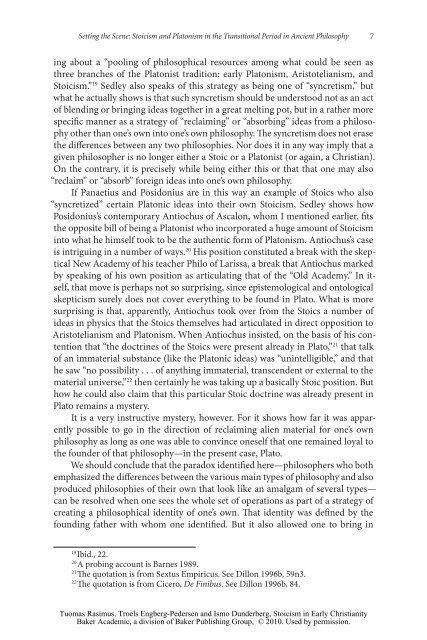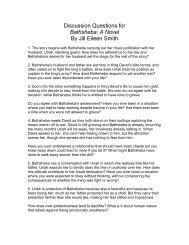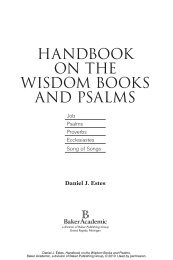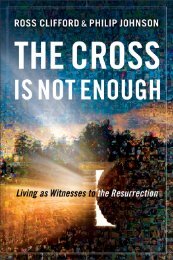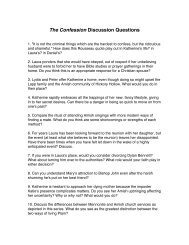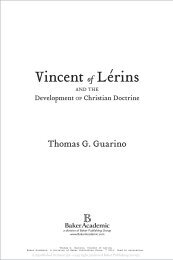stoicism in early christianity - Baker Publishing Group
stoicism in early christianity - Baker Publishing Group
stoicism in early christianity - Baker Publishing Group
You also want an ePaper? Increase the reach of your titles
YUMPU automatically turns print PDFs into web optimized ePapers that Google loves.
Sett<strong>in</strong>g the Scene: Stoicism and Platonism <strong>in</strong> the Transitional Period <strong>in</strong> Ancient Philosophy 7<br />
<strong>in</strong>g about a “pool<strong>in</strong>g of philosophical resources among what could be seen as<br />
three branches of the Platonist tradition: <strong>early</strong> Platonism, Aristotelianism, and<br />
Stoicism.” 19 Sedley also speaks of this strategy as be<strong>in</strong>g one of “syncretism,” but<br />
what he actually shows is that such syncretism should be understood not as an act<br />
of blend<strong>in</strong>g or br<strong>in</strong>g<strong>in</strong>g ideas together <strong>in</strong> a great melt<strong>in</strong>g pot, but <strong>in</strong> a rather more<br />
specific manner as a strategy of “reclaim<strong>in</strong>g” or “absorb<strong>in</strong>g” ideas from a philosophy<br />
other than one’s own <strong>in</strong>to one’s own philosophy. The syncretism does not erase<br />
the differences between any two philosophies. Nor does it <strong>in</strong> any way imply that a<br />
given philosopher is no longer either a Stoic or a Platonist (or aga<strong>in</strong>, a Christian).<br />
On the contrary, it is precisely while be<strong>in</strong>g either this or that that one may also<br />
“reclaim” or “absorb” foreign ideas <strong>in</strong>to one’s own philosophy.<br />
If Panaetius and Posidonius are <strong>in</strong> this way an example of Stoics who also<br />
“syncretized” certa<strong>in</strong> Platonic ideas <strong>in</strong>to their own Stoicism, Sedley shows how<br />
Posidonius’s contemporary Antiochus of Ascalon, whom I mentioned earlier, fits<br />
the opposite bill of be<strong>in</strong>g a Platonist who <strong>in</strong>corporated a huge amount of Stoicism<br />
<strong>in</strong>to what he himself took to be the authentic form of Platonism. Antiochus’s case<br />
is <strong>in</strong>trigu<strong>in</strong>g <strong>in</strong> a number of ways. 20 His position constituted a break with the skeptical<br />
New Academy of his teacher Philo of Larissa, a break that Antiochus marked<br />
by speak<strong>in</strong>g of his own position as articulat<strong>in</strong>g that of the “Old Academy.” In itself,<br />
that move is perhaps not so surpris<strong>in</strong>g, s<strong>in</strong>ce epistemological and ontological<br />
skepticism surely does not cover everyth<strong>in</strong>g to be found <strong>in</strong> Plato. What is more<br />
surpris<strong>in</strong>g is that, apparently, Antiochus took over from the Stoics a number of<br />
ideas <strong>in</strong> physics that the Stoics themselves had articulated <strong>in</strong> direct opposition to<br />
Aristotelianism and Platonism. When Antiochus <strong>in</strong>sisted, on the basis of his contention<br />
that “the doctr<strong>in</strong>es of the Stoics were present already <strong>in</strong> Plato,” 21 that talk<br />
of an immaterial substance (like the Platonic ideas) was “un<strong>in</strong>telligible,” and that<br />
he saw “no possibility . . . of anyth<strong>in</strong>g immaterial, transcendent or external to the<br />
material universe,” 22 then certa<strong>in</strong>ly he was tak<strong>in</strong>g up a basically Stoic position. But<br />
how he could also claim that this particular Stoic doctr<strong>in</strong>e was already present <strong>in</strong><br />
Plato rema<strong>in</strong>s a mystery.<br />
It is a very <strong>in</strong>structive mystery, however. For it shows how far it was apparently<br />
possible to go <strong>in</strong> the direction of reclaim<strong>in</strong>g alien material for one’s own<br />
philosophy as long as one was able to conv<strong>in</strong>ce oneself that one rema<strong>in</strong>ed loyal to<br />
the founder of that philosophy—<strong>in</strong> the present case, Plato.<br />
We should conclude that the paradox identified here—philosophers who both<br />
emphasized the differences between the various ma<strong>in</strong> types of philosophy and also<br />
produced philosophies of their own that look like an amalgam of several types—<br />
can be resolved when one sees the whole set of operations as part of a strategy of<br />
creat<strong>in</strong>g a philosophical identity of one’s own. That identity was def<strong>in</strong>ed by the<br />
found<strong>in</strong>g father with whom one identified. But it also allowed one to br<strong>in</strong>g <strong>in</strong><br />
19 Ibid., 22.<br />
20 A prob<strong>in</strong>g account is Barnes 1989.<br />
21 The quotation is from Sextus Empiricus. See Dillon 1996b, 59n3.<br />
22 The quotation is from Cicero, De F<strong>in</strong>ibus. See Dillon 1996b, 84.<br />
Tuomas Rasimus, Troels Engberg-Pedersen and Ismo Dunderberg, Stoicism <strong>in</strong> Early Christianity<br />
<strong>Baker</strong> Academic, a division of <strong>Baker</strong> Publish<strong>in</strong>g <strong>Group</strong>, © 2010. Used by permission.


